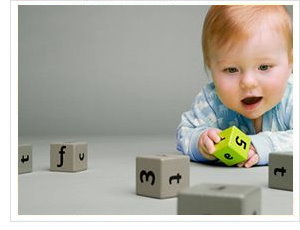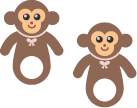Myth 1: Babies can't learn math!

If you think babies can't learn mathematics, it is probably because babies are too young to master some skill that you associate with understanding or doing math. "You need reasoning skills to do math," you might think, or "You need to be able to write to do math," or even, simply, "You need to be able to count to do math."
None of these statements is true when it comes to teaching babies math. In fact, the opposite is true: the beauty of teaching mathematics to babies is that it is precisely before children have started counting that they will derive the most benefit from lessons in quantity.
Lessons in quantity aim to give children a sense of the reality of numbers (as opposed to the symbols - 1, 2, etc - that represent them). To find out more (and to see a video of three-year-olds doing math problems), go to Perceiving Quantity (Subitizing).
After a few weeks of quantity lessons, you will add equations to your sessions with your child. The aim here is not, of course, to teach any particular equation.
Rather, you are teaching your child what addition, subtraction, multiplication and division are. Your child sees what these functions are by seeing them in action.
This is fundamentally different to making children memorize their times tables. If you teach your child mathematics as a baby, she will never need to memorize her times tables, because she will be able to do multiplication in her head as easily as if she were using a calculator.
